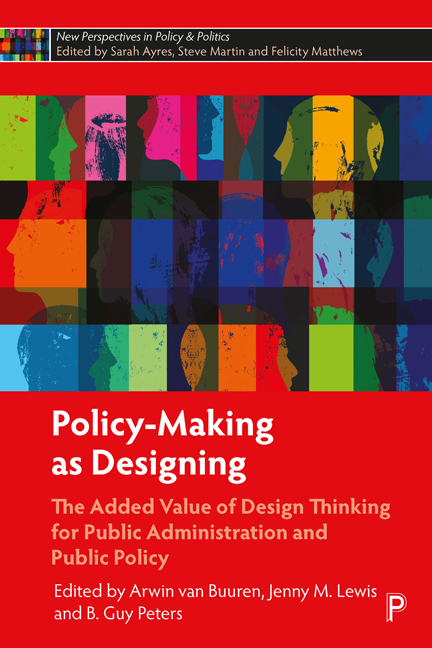 Policy-Making as Designing
Policy-Making as Designing Book contents
- Frontmatter
- Contents
- List of figures and tables
- Notes on contributors
- 1 Improving public policy and administration: exploring the potential of design
- 2 Applying design in public administration: a literature review to explore the state of the art
- 3 Challenges in applying design thinking to public policy: dealing with the varieties of policy formulation and their vicissitudes
- 4 Designing environments for experimentation, learning and innovation in public policy and governance
- 5 Policy Labs: the next frontier of policy design and evaluation?
- 6 When design meets power: design thinking, public sector innovation and the politics of policy-making
- 7 Designing institutions for designing policy
- 8 Applying design science in public policy and administration research
- 9 Using a design approach to create collaborative governance
- 10 Policy-making as designing: taking stock and looking forward
- Index
3 - Challenges in applying design thinking to public policy: dealing with the varieties of policy formulation and their vicissitudes
Published online by Cambridge University Press: 20 January 2024
- Frontmatter
- Contents
- List of figures and tables
- Notes on contributors
- 1 Improving public policy and administration: exploring the potential of design
- 2 Applying design in public administration: a literature review to explore the state of the art
- 3 Challenges in applying design thinking to public policy: dealing with the varieties of policy formulation and their vicissitudes
- 4 Designing environments for experimentation, learning and innovation in public policy and governance
- 5 Policy Labs: the next frontier of policy design and evaluation?
- 6 When design meets power: design thinking, public sector innovation and the politics of policy-making
- 7 Designing institutions for designing policy
- 8 Applying design science in public policy and administration research
- 9 Using a design approach to create collaborative governance
- 10 Policy-making as designing: taking stock and looking forward
- Index
Summary
Introduction: policy formulation and the relationship between traditional policy design studies and ‘design thinking’ in the policy realm
Policy design is an activity undertaken in the process of formulating policy options with an eye towards the effectiveness of subsequent implementation activity. It involves the conscious effort on the part of analysts and advisors to scrutinise, learn and apply lessons from best practices and past policy successes and failures to the crafting of policy alternatives which are expected to achieve government aims and ambitions in an efficient and effective way (Howlett et al 2009; Howlett and Mukherjee 2017; 2018).
Policy design in this sense is thus only one of many possible types of policy formulation, one centred on knowledge generation and application in the creation of policy alternatives logically and experientially expected to attain specific government goals. It is not synonymous with formulation but is rather a variety of the latter. It can thus be thought of as a form of generating policy alternatives which goes about formulating policy options in a ‘design’ way: that is, as a calculated method of knowledge-intensive problem resolution (Colebatch 2017; Howlett 2019).
This is very different from other formulation techniques such as legislative bargaining, corrupt or clientelistic promotion of alternatives, promotion of schemes embodying partisan electoral advantage, or alternative generation centred on other non-knowledge driven processes such as bureaucratic politics and budget maximisation or leader experiences and heuristics (Gans-Morse et al, 2014; Chindarkar et al, 2017; Schneider and Ingram 2018). These latter processes are all equally efforts to formulate policy alternatives but do not resemble at all what is commonly meant by ‘design’ and hence are sometimes referred to as ‘non-design’ (Howlett and Mukherjee 2014).
It is also true, however, that ‘design’ can be undertaken in many different ways and policy studies must deal not only with design and non-design formulation activities but also with the origins, evaluations and propensities of different design-oriented formulation efforts. These range from topdown expert-driven ‘technocratic’ planning exercises to more wide-open public participation processes (Bason 2014; Howlett and Mukherjee 2017; Blomkamp 2018).
- Type
- Chapter
- Information
- Policy-Making as DesigningThe Added Value of Design Thinking for Public Administration and Public Policy, pp. 51 - 71Publisher: Bristol University PressPrint publication year: 2023


